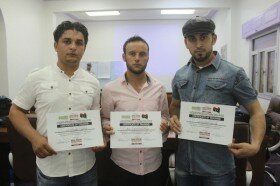
One week ago, today, two video journalists from the city of Misurata were kidnapped while covering Libya’s historic national elections. I had the pleasure to meet and work with these men during my recent trip there with my colleague and co-trainer Louis Abelman in May 2012.
Abdelqadr Fassouk and Yusuf Badi worked together as part of a three man team during our video boot camp in Misurata. Together they worked to produce a story about the head of the nursing department at Misurata’s only hospital.
The team did great visual work at the time, demonstrating a clear understanding of how to produce brief news packages. However they missed one small detail. They decided to record the video without audio.
When Louis and I explained their mistake, Abdelqadr and Yusuf insisted on reshooting the piece in its entirety. They exemplified a typical character of Misuratis, willingness to do whatever it took to get the job done.
Though the two men work well as a team, it’s clear sometimes they face some tension. Abdelqadr wished to learn the basics of editing. He wanted to finish the piece quickly and submit it to the election awareness campaign SWN was working on with the support of Doha Centre for Media Freedom. Yusuf, on the other hand, was far more interested in cutting and re-cutting the piece. His goal was not to finish the piece, but to understand the editing software, deleting the finished sequence and starting from scratch each time.
The term “Frenemies” might be fitting. Both men were generally good humored and if they aren’t getting in each other’s way, I trust they’d have no better companion in such a trying time.
Despite their good company, I am greatly concerned about their safety. The Facebook era has meant that repeated false claims of their release have been widely distributed by colleagues, friends, and fellow Libyans who desperately want the news to be true. As of this writing, Abdelqadr and Yusuf are still detained, and though their general whereabouts are believed to be inside Bani Walid, their specific location is unknown.
Misurata and Bani Walid have a longstanding feud, exacerbated by the Libyan revolution. The kidnapping of two much-loved journalists from Misurata has pushed the conflict again to the front of discourse about the future of the new Libyan state. So far, Facebook rumors notwithstanding, negotiations have not yet completely broken down. Though many are campaigning to use the kidnapping as a pretext to return to war, they’ve thus far not been successful. For the sake of Abdelqadr, Yusuf, and all of Libya, I hope our friends will be freed without further violence.
Brian Conley
Small World News
[For additional information about Abdelqadr Fassouk and Yusuf Badi, see the Committee to Protect Journalists's Libya alerts, Reporters Without Borders, and articles by the Libya Herald, Associated Press, and McClatchy.]
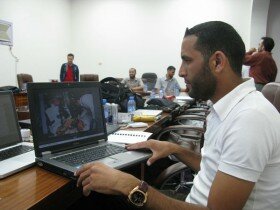
The Misrata trainees have so far done justice to their town’s reputation as a hard-working, can-do kind of place, and are well on their way to fulfilling the mission we set out: to produce four videos in four days. They seemed to be satisfied with our second day spent covering production basics, as many of them have prior production experience (more on that below) but none have had formal training.
Most of the guys (they are all guys, unfortunately) picked up cameras during the fighting that ravaged their town last year and became the media arm of the uprising. Some worked as fixers for the international press. They are amateurs who have more experience filming in situations of intense stress than most professionals. But though they have proven their bravery and bonafides as war photographers and cameramen, displaying their trophies– I was shown several pictures of Qadaffi’s corpse with one of our proud trainees working a camera in the frame (pictured above)– they seem to have not quite figured out how they will transition to becoming peacetime media professionals.
In addition to their inexperience, we can add their youth and thirst for adrenaline as obstacles to professionalism. Maybe there is less glory in covering a local election than a firefight, so there’s a constant push to spice things up, to add special effects to any production. Dramatic music. Anything from After Effects: explosions, fire, wild text animation.
What kind of work will they produce? Will they take up the calling of journalism and its accompanying watchdog ethic, at least as we traditionally understand it in the west, or will they continue to produce propaganda for their “side”– their town and their Katibas [militias or brigades]– as they risked their lives to do during the revolution?
Our challenge is to temper some of their enthusiasm and show that there is satisfaction in assembling a documentary style story about real life. To that end we are pushing them to defy their own instincts and make something “boring,” maybe just to make us, the foreigners, happy. So far it’s working: all the trainees are making projects that conform to the vision we set out, showing disciplined and respectful attitudes toward what we are telling them to do (they take pride in having that kind of attitude here).
Misrata is not traditionally a media town, but the field is open for these young guys to build a professional media sector here, if they want it.
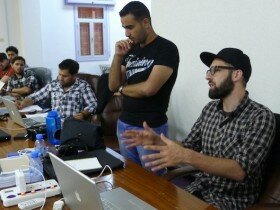
Our second workshop is being held at the office of the Misrata Media Union. The MMU is an organization that hopes to work for the support of all Misrati journalists. They provided Small World News a warm welcome. They have a large conference room more befitting an executive boardroom than a training space. I’m learning that the impact of comfortable chairs cannot be overestimated in improving the demeanor of trainees over a long day.
Sixteen journalists and mediamakers from all over Misrata were present. Misrata TV, Tobacts TV, Tobacts FM and the Freedom Group all sent representatives to the training. It was great to see journalists from across the city sit together and collaborate. We saw similar attitudes in our training in Tripoli, however its clear that there is a quite a bit more competition between media in Tripoli, while in Misrata they seem less concerned about competing directly with each other.
We hoped that being able to show the results of our first training in Tripoli would make it easier to explain the goal of the workshop and the national campaign. This was not the case. I think its quite possible this made our task more difficult in some ways. The trainees latched onto whatever criticism they had of an individual video. Only a few seemed able to recognize the greater impact or potential reach. Its an understandable difficulty, there is very little history of individuals speaking for themselves, and even less of listening to such individuals.
Perhaps it just takes time for the notion to sink in. Later in the day several individual trainees presented quite compelling story ideas, after previously seeming to have not a clue how to approach the concept. It is my belief that one of the best ways to assist Libyans to move toward unity and broader understanding, is simply to show as diverse an array of individual Libyans as possible. Opening a space for Libyans to hear from a truly diverse cross-section of their fellow citizens can serve to create bonds not possible through more direct means. Yet when you have never had a space for individuals to speak their minds freely, its hard to grasp the importance, or even the relevance of such stories.
By the end of the day the trainees had broken up into a half dozen groups. They told me most of them in each group were from different organizations and had not worked together before. I’m looking forward to see what the Misrati trainees produce. They are a strong and dedicated bunch. If they apply themselves, and believe in the value of human stories from everyday Misratis, I expect they’ll create some great work in the next four days.
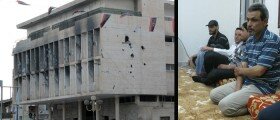
Tonight we’ve arrived in Misrata, the site of our next workshop. The city lies along the Mediterranean coast 187 km (116 miles) east of Tripoli and is Libya’s third largest, a commercial hub hit hard by the war. It’s been a year since revolutionaries cleared the city of Qadaffi loyalists after months of deadlocked fighting, and the blast marks of howitzers and machine gun fire still scar Tripoli street, the now infamous main drag. Misrata has a fiercely independent streak within Libya today, due to its unique role during the war and the contributions of its militias to Qadaffi’s final overthrow (it was in Misrata that the leader’s body was displayed to the public in a meat locker). Misrata’s name is also freighted with significance within the community of foreign reporters, as it was here that the distinguished photojournalists Tim Hetherington and Chris Hondros were killed.
There is some sense in Libya that Misrata is a world apart, a sort of city-state where residents started the work of building the post-Qadaffi order on an accelerated timetable. City council elections were successfully held here in February of this year, months ahead of June’s planned national assembly elections (the national assembly will select a committee to draft Libya’s constitution). Misrata already has three of its own TV channels. Its victorious brigades have not been fully disbanded. As in much of the rest of the country these armed groups fall under the merely nominal authority of the national defense ministry, and do pretty much as they please.
We were received warmly by our hosts from the local media council at a spacious TV station by the sea. It was already late, but more than half of our prospective trainees were there to greet us. Brian introduced us with a now established good cop-bad cop routine, and prodded everyone to not be outdone by the Tripoli workshop’s videos; we expect strong work here. The facilities are excellent and the young people we met, many of whom established themselves with front-line reporting during the uprising, seem eager. We are told we are the first foreign media trainers in the city.
Guiding the enthusiasm on display to contribute to an election awareness campaign that is nationwide may present a challenge, as Misrata is still mending and residents are keen to display the wounds of their war. We hope to appeal to a sense of national purpose that will transcend local pride, as the contest of regional loyalties happening in Libya right now is one of the biggest obstacles in rebuilding the nation.
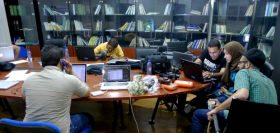
Small World News is in Libya for the third time since the revolution began. Although the revolutionary edge of the nation’s enthusiasm may have subsided, the enthusiasm itself has not. Libyans are excited to build their country, and actively looking for partners to provide assistance and mentorship. This desire led directly to the creation of our new project, a series of production bootcamps around the country. Throughout May, Louis Abelman and Brian Conley, along with Alive in Libya’s Mohamed M Essul will run a series of workshops across Libya.
We are excited by the broad support we have received from the Doha Centre for Media Freedom. With their support Small World News has developed a program that looks beyond training. We are using the phrase “production bootcamp” because we see each event as more than “training.” Our goal is to work side-by-side with Libyans across the country to produce a series of videos. These videos will form a campaign over the next several weeks encouraging Libyans to vote.
There is a general lack of capacity in the Libyan media to produce short, dynamic news packages quickly. Libyan news currently focuses primarily on talk shows, and studio-based news programming. By encouraging a bootcamp, on-the-job style experience, trainees will learn theory that is quickly informed by practice.
Currently there is also a huge lack of real information about the election. The day before registration began on May 1, many Libyans did not even know where to register. Others were confused about the exact purpose of registration. Furthermore, many Libyans are even unclear about when the elections should occur. Its June 19th according to our latest information, yet many still believe it is June 23rd.
The workshops will bring together a diverse group of media makers in each city. These trainees will work together in a series of production teams, conceiving a story, shooting the story, and finally assembling, all in a matter of days. We have crafted the campaign around the idea that individual Libyans are best suited to convince their fellow citizens to vote. We are attempting to blend short documentary features, telling one individual story, with energetic, get-out-the-vote style language. We hope this innovative approach will connect with average Libyans and educate them about the upcoming election.
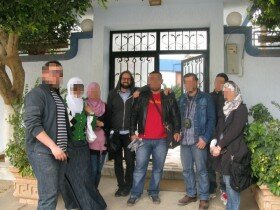

Alive in Libya Team
This morning, the Online Journalism Blog ran an interviewwith the creators of a UK-based hyperlocal news site, South Norwich News. While the model of hyperlocal journalism is controversial (is it needed? is it sustainable?), creator Claire Wood is confident that hyperlocal content is a worthy companion to larger media outlets:
We’re very much in the news business but on a very small scale. We wanted to get away from deadlines and pressures that cause papers and news bulletins to churn out the same press releases across the day.
Some big stories we can’t avoid covering along with the local paper or radio station, but we always try to find a different angle. There’s little point covering the same stories that people can find elsewhere.
As we become more established, it becomes easier to set our own agenda. We aim to delve a little deeper into stories which matter to people locally which other news outlets might not be able to do in such detail.
At the same time, Knight Foundation unveiled the winners of their 2011 Knight News Challenge. While many of the prize recipients focused on the solving some of the complications with online mass media, a few of them were geared more toward smaller, more local journalism projects. This one in particular caught our eye:
Project: OpenBlock Rural
Winner: University of North Carolina, Chapel Hill, N.C.
Award: $275,000
Project lead: Ryan Thornburg
Website: jomc.unc.edu
Twitter: @rtburgRural news organizations often struggle to move into the digital age because they lack the staff to make public data digestible. OpenBlock Rural will work with local governments and community newspapers in North Carolina to collect, aggregate and publish government data, including crime and real estate reports, restaurant inspections and school ratings. In addition, the project aims to improve small local papers’ technical expertise and provide a new way to generate revenue.
Small World News is especially interested in localized content, as one of the issues we’ve consistently grappled with throughout our many projects is getting content not only out of the country, but also to distribute content within the country itself. We’re currently investing and exploring different options for offline digital distribution, such as bluetooth, USB drives, and CD/DVD’s.
Alive in Libya has been quite successful at bringing the stories of Libyans to the outside world, especially Westerners, but it is still not reaching its full potential when it comes to providing news for citizens living in Libya.
First of all, why is it that more Libyans aren’t watching Alive in Libya right now?
We’ve been getting a lot of positive feedback from Libyans abroad as well as Libyans here who have managed to get online and watch some videos, or got their hands on our material one way or another. Mainly now most Libyans can’t watch because of the lack of internet access.
What kind of news are Libyans most interested in? Local stories or news from outside Libya?
I think there’s an audience for each. Libyans have been deprived of active local media for years, they don’t know how to feel when they see a report on Alive in Libya that’s discussing some issue they’re personally dealing with. TV has always been a Gaddafi glorifying instrument, not a way to report about Libyans’ day-to-day problems and issues.
Are there ways for the content to reach Libyans without internet access?
As for now we have printed 100 CDs [pre-loaded with Alive in Libya content] to distribute. The more efficient way to get our material to a Libyan audience is to get them on the new Libya TV channels that have been appearing on satellite. We’re currently in the process of discussing this matter with a few of these channels.
Are there any issues with these new TV outlets? Are they adequately serving the needs of Libyans?
The channels are very pro-revolution obviously, which sometimes diminishes their value as a news source. I personally do not trust the news I hear on them, they’re usually modified to be pro-revolution.
One of the things that the new Libyan channels are suffering from is a common problem among all Arab channels: they just love “analysts” – people who generally tell you how you should view something or how you should feel or react towards it. The people on the streets don’t get enough air time. And if they do, the interviewer’s questions are usually loaded and end up guiding the person towards a specific answer.
Given an unlimited budget, how would you shape Alive in Libya to better serve citizens inside Libya?
I would put Alive in Libya bureaus in all the major cities [There is only one bureau currently in Benghazi, with one planned in Misrata]. I’d start a TV channel where the time slots are divided among these offices. They’d broadcast what’s happening in their region, and their time slot would rotate so no one office gets prime time all the time.
Would you do anything with mobile phones or the internet? Or just bypass those for now until Libya has more access to the internet?
Sadly, Libya is a bit behind when it comes to telecommunication. So if I had unlimited funding, for the time being, I’d focus more on TV.
Of course the bureaus around Libya would still be producing for the Alive in Libya website. And the way mobile phones are changing now, soon you won’t have “internet & mobiles” you’ll just have internet.
Figuring out how to make and adequately distribute content relevant to locals will continue to be one of the issues that concerns us, in Libya or any of the other host countries for Alive.In projects. Whether hyperlocal is an adequate model for this kind of journalism remains to be sorted out, but some solution must be devised in order to reach the local citizen themselves, beyond the foreign and western audience.
For more information on the Alive.In projects, visit Alive in Libya, or follow us on Facebook and Twitter.
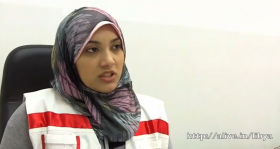
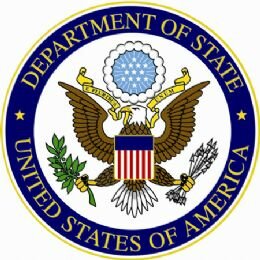 Previously we’ve written here about how citizen media – the stories of those on the ground – can be used to provide much-needed context for journalists, analysts, and policy makers. Knowing the specifics of what’s happening, and learning it from the locals themselves, ensures better intelligence and therefore better decision making.
Previously we’ve written here about how citizen media – the stories of those on the ground – can be used to provide much-needed context for journalists, analysts, and policy makers. Knowing the specifics of what’s happening, and learning it from the locals themselves, ensures better intelligence and therefore better decision making.
But what does citizen media offer the general public – consumers, voters, and interested parties? The short answer is Accountability.
In the relationship between ordinary citizens and policy-makers, the value of citizen media goes both ways. The same data provided to decision makers can be turned around and used by citizens to hold the authorities accountable.
To see this in action, let’s look at a recent editorial written by US Assistant Secretary of State for Near Eastern Affairs Jeffrey Feltman. In it, he tells a “tale of two cities” – pre-revolution Tripoli and post-revolution Benghazi – and offers what it is he thinks the US’ interests and priorities in Libya should be.
My visit to Tripoli in December was full of dark threats and ominous portents. The fear was palpable. One Libyan official told me that if you so much as dared to speak of Qadhafi’s paranoia and quirks you would be killed. Qadhafi’s thugs had taken to harassing our embassy personnel. It was a harbinger of worse things to come…
Last week in Benghazi, though, I saw what Libya could become — and it was clear as day why it is in the U.S. interest to see the Benghazi vision for Libya succeed over Qadhafi’s. The collective sense of joy and opportunity was unlike anything I have experienced in my diplomatic career…
He also makes a few claims that might be surprising – or questionable – to the average reader.
Everyone, from rights activists, to businessmen, to members of the Transitional National Council (TNC), projected a sense of exhilaration. Civil society organizations of every stripe seemed to pop up almost before my eyes. Citizens seemed astonished and delighted that they can at last speak their minds, and plan for a different Libya than the one they have endured for the past 40-plus years.
In the many years I have worked in the Middle East, I’ve never been to an Arab city so grateful to the United States. Libyans in Benghazi know how brutal their former ruler is. They are profoundly appreciative to have been spared what would have undoubtedly been a massacre of enormous proportions in mid-March, had NATO not intervened. Imagine walking in the main square of a teeming Arab city and having people wave the American flag, clamor for photographs with a visiting American official, and celebrate the United States as both savior and model.
So if you’re a US citizen reading this in Politico, how do you know if what Feltman is saying about Libya is true?
Simple. Ask a Libyan.
In this case, that means citizen media produced by Libyans – Alive in Libya.
Are there civil society organizations of every stripe popping up seemingly overnight? Yes.
The Libya Red Crescent has stepped up and is working to seek out missing persons, those “disappeared” by the Gaddafi regime. Benghazi police have, of their own volition, gone back to work to restore order and civility to the city. And the Youth for Change (YoC), a wholly new organization, has emerged to better connect the restive youth of Libya to the leaders of their government ministries.
Are Libyans planning for a new society, different from the tyranny and inequality they’ve previously experienced? Yes.
Volunteers have set up media assistance centers where journalists can access partners and resources to better tell their story – a far cry from the strictly controlled propaganda of the previous regime. Even the TNC, the rebel council only in existence for a few short months, is deliberate in its attempts to meet the egalitarian standards of a new, pluralist society.
And what about the most questionable piece, the scenes of Libyans waving American and other flags in the streets? Also true.
See for yourself:
Just as the policy-makers don’t need to blindly trust their bureaucracies, the general public doesn’t have to simply take the words of policy-makers at face value. Citizen media allows you to verify official statements, and to hold those officials accountable.
Citizen media is a powerful tool, not only for those producing it, but for everyone. Remember this the next time an editorial like Feltman’s comes along. You don’t have to trust it. Check it against the stories of those who aren’t official policy makers, those who live and work on the ground every day.
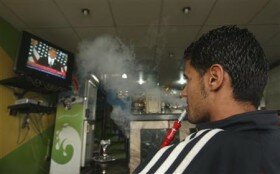
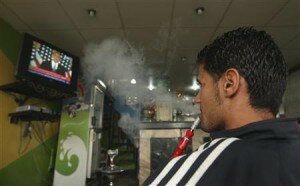
A Libyan watches a television broadcast of a speech by President Barack Obama in U.S., at a shop in Benghazi May 19, 2011. Credit: REUTERS/Mohammed Salem
From President Obama’s speech on the Middle East and North Africa, delivered this morning at the State Department:
We will continue to make good on the commitments that I made in Cairo ” to build networks of entrepreneurs, and expand exchanges in education; to foster cooperation in science and technology, and combat disease. Across the region, we intend to provide assistance to civil society, including those that may not be officially sanctioned, and who speak uncomfortable truths. And we will use the technology to connect with ” and listen to ” the voices of the people.
In fact, real reform will not come at the ballot box alone. Through our efforts we must support those basic rights to speak your mind and access information. We will support open access to the Internet, and the right of journalists to be heard ” whether it’s a big news organization or a blogger. In the 21st century, information is power; the truth cannot be hidden; and the legitimacy of governments will ultimately depend on active and informed citizens.
Small World News welcomes the US government’s commitment to the values of free speech and a free press. As we have witnessed through our work over the last five years, these values are more than abstract ideals; they are concrete goals sought universally by citizens around the world.
But these goals cannot be reached through words alone. As Small World News’ Brian Conley and Louis Abelman have written, supporting the aspiration of free expression is a lengthy and complex process:
Over 2010 we engaged in a broad expanse of projects: helping start a daily news program produced by Indian community activists; training Ethiopian journalists in exile to protect themselves online; supporting Rwandans with new media training; training Iraqi civil society organizations and technologists to develop a strategy and implement social media and mapping tools, teaching Afghan journalists to leverage the latest in mobile journalism tools; supporting an international monitoring organization and local humanitarian one to leverage mobile technology and mapping to monitor the Afghan parliamentary election; working with Bahraini human rights activists to develop tools to monitor their parliamentary election; and training Tibetan and Indian activists to leverage video as a tool to promote their work.
Today we hope to utilize the breadth of our work over the last five years to continue creating a space for voices go regularly unheard by the international community. This means centralizing the fragmented locations where dialogue is happening, and making sure those voices are curated and contextualized, as well as translated to English and other languages when necessary. It also means meeting with local contacts, providing training and equipment and infrastructure support as necessary. In a place like Afghanistan it may even involve coordinating with telecommunications companies as we’ve done previously, or developing methods that better prioritize the most accessible tools, such as voice and mobile platforms particularly in rural and low bandwidth communities.
While the value of free expression is universal, the solution is highly contextual. Each country presents unique challenges and opportunities for reaching our goals.
For instance, in Libya, citizens in eastern cities like Benghazi and Ajdabiya have considerable access to local media, through television and radio. But this media generally takes the form of revolutionary propaganda and opinion slanted in support of the rebellion. The opportunity existed for Alive in Libya to create a free and independent news source for Libyans as well as the international community.
This allowed Libyans access to news about their most pressing concerns not found in revolutionary media. For example, our teams of correspondents on the ground offer information on access to electricity in Ajdabiya…
…as well as information on organizations monitoring and seeking out persons who’ve gone missing in the conflict:
Small World News is excited to be a part of the global push for free expression, and we applaud the government’s stated goals of empowering journalists, bloggers, and civil society groups in support of that mission. We continue to build and train our networks of individuals and organizations, not only in Libya, but regionally and worldwide, so that these voices can be heard.
For more information on the Alive.In projects, visit Alive in Libya, or follow us on Facebook and Twitter.
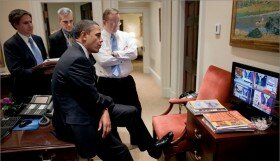
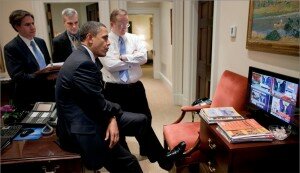
Photo by White House 2011
David Kenner wrote this week about President Obama’s news sources for Foreign Policy‘s Passportblog:
With one sentence, the New York Times raised dozens of Middle East pundits’ hopes that their words were reaching the most powerful man in the world. “At night in the family residence…Mr. Obama often surfs the blogs of experts on Arab affairs or regional news sites to get a local flavor for events,” read Mark Landler’s account of how the Obama administration will attempt to use the killing of Osama bin Laden to recast the U.S. relationship with the Arab world.
Well, Mr. President, we have some late-night reading suggestions for you.
Mr. Kenner generously suggested that the president read Small World News’ Alive in Libya as one of his late night sources, putting us in esteemed company alongside blogs like Joshua Landis’ Syria Comment and Reidar Visser’s Iraq & Gulf Analysis.
But counting decision makers in Washington among your readers is worth much more than flattery and bragging rights. Mr. Kenner has highlighted one of the most important functions of citizen media, that of providing the premiere source of context for the issues that affect us most.
Citizen media empowers and enables local citizens to tell their own story, report their own news, and communicate their own perspective to the outside world. Locals Alive In a country understand the context, the history, and the details of important news stories more thoroughly than reporters alive from the country. Local citizens are able to understand the news for what it is, and how it directly affects them. It is these voices that are under-represented, or not represented at all, in traditional, mainstream media.
Small World News in particular is concerned with allowing the viewer access to the daily lives, feelings, and opinions of citizens on the ground, the so-called “human element” of journalism. It is these seemingly ordinary experiences that truly allow the viewer to experience the extraordinary, the events that move and shape the world we all live in.
Combining both the understanding of and empathy with local citizens provides the viewer with the ultimate context for any news story. The importance of this context, for viewers, policy makers, and officials, cannot be overstated.
For more citizen media from Small World News, see some of the other projects in our Alive.In series:
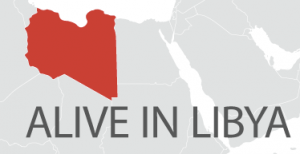
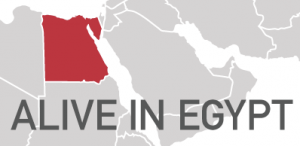
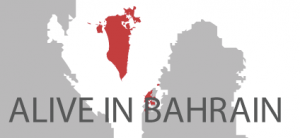
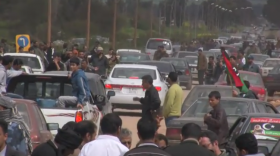
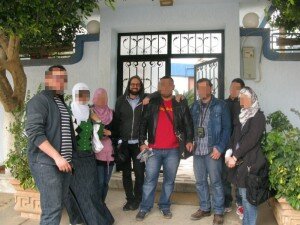
Alive in Libya team in Benghazi, March 2011
In March 2011, Brian Conley and Louis Abelman journeyed to Benghazi to lay the foundation for Alive in Libya.
Entering Libya through the Egyptian border in the east, and arriving just three weeks after the revolution began, they set about making contact with local citizens at a media center set up by the opposition movement. They met with a fixer, Marwan, who became the first Libyan team member on the project. Soon after they were joined by Ahmed, a former music blogger turned citizen journalist, and Seraj, a translator and English teacher.
What followed was a 3-day crash course in citizen media, covering everything from journalistic ethics to editing and uploading digital video. The training was abruptly cut short by an imminent threat of attack on Benghazi by Gaddafi’s forces. Brian and Louis fled the city, along with the majority of the international press corps. The project appeared to be at an end.
Less than two days later, though, the local team in Benghazi recovered from the assault and began putting their training into action. A series of videos, including dramatic footage of air battles over Benghazi, interviews with rebels at the front in Ajdabiya, as well as the spring flower festival were uploaded to Small World News‘ producers in the United States, and kept Alive in Libya online.
In its first two weeks, the team produced over 25 video segments, with subjects ranging from footage of the executions of Gaddafi’s mercenaries to short documentaries on Red Crescent refugee camps. The content was then vetted, translated, and published on the Alive in Libya website.
Since then Alive in Libya has published over 400 videos and articles, both original content from our team in Benghazi, and curated and enhanced content from other local citizen journalists and producers inside Libya.